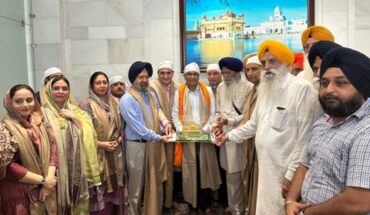by Salman Ahmed-(National Secretary, Jamaat-e-Islami Hind)
The serene Baisaran meadow in Pahalgam, Kashmir is known as the Switzerland of India. Every year, thousands of tourists from all over the country descend upon its lush green fields to enjoy its picturesque beauty and snowclad mountain scenery. Unfortunately, that ‘paradise on earth’ turned into a blood-soaked nightmare on April 22, 2025, with terrorists opening fire, killing 26 tourists and critically wounding many more. Among those who survived the carnage was Debasish Bhattacharyya, an Associate Professor from Assam University, vacationing in Kashmir with his wife and son. He was resting beneath a pine when gunfire shattered the calm. Debasish saw that the terrorists were separating the Hindus from the Muslims by asking the tourists to recite the Islamic kalima, “La ilaha il-lal-lah.” Those who could recite the “kalima” were spared, while the rest of the men were shot and killed at close range. Heart pounding, Debasish began chanting the sacred words. A gunman loomed, eyes cold, demanding proof of his faith, Debasish raised his voice. He recited the kalima with fervent clarity, each syllable a plea for survival. Fortunately, the terrorist moved on, sparing him and his family. As bullets flew, Bhattacharyya fled with his family. Stumbling through dense forest, they scaled a seven-foot fence and followed horse trails to safety. Shaken but alive, Debasish Bhattacharyya’s daring escape grabbed instant headlines in the mainstream media. TOI’s headline was, “Assam Hindu prof recites ‘kalima’ to escape Pahalgam massacre”.
The social media response to Debasish Bhattacharyya’s survival of the Pahalgam terror attack was highly divisive. Some posts praised Bhattacharyya’s presence of mind and knowledge of the kalima. “Just imagine, if you want to live in #India peacefully you should know how to recite #Kalma,” tweeted someone, tying the incident to the narrative of Hindus being unsafe in their own country because of Muslims. Hashtags #Kalma #Kalima emerged specifically concerning Bhattacharyya’s incident and other eyewitnesses who described in graphic detail how tourists were killed only because of their religious identity and if they passed the ‘kalima’ test. The Islamic Shahada, often called the kalima, is the fundamental declaration of faith in Islam. The Arabic words of the kalima are: “La ilaha illallah, Muhammadur Rasulullah”. It means “There is no God but Allah” and “Muhammad is the Messenger of Allah.” It affirms that Prophet Muhammad ﷺ is God’s final Prophet, chosen to deliver His message to humanity. It symbolizes recognition of one’s Creator, liberation from worldly servitude, and a journey from darkness to light. The kalima is a sign of knowledge, light, and freedom, embodying success and unity. It must be recited willingly, from a heart filled with belief, love, and devotion to God. Forcing its recitation, as the terrorists did, violates its spirit. Islam never commands killing or harming those who don’t recite the Kalima, instead granting humans freedom of choice. The Prophet Muhammad ﷺ never coerced anyone into reciting the kalima, nor did true believers ever oppress others for not reciting it, as the kalima inherently opposes tyranny and injustice.
For a billion Muslims, the kalima is a pledge and the foundation of their faith. In its purest form, it is a call to unity, recited in mosques, homes, and moments of quiet devotion. By demanding the kalima for snuffing out innocent lives, the terrorists twisted this sublime and profound testimony of the Islamic creed into a lethal litmus test of religious identification. The terrorists executed a textbook case of the “misuse of religion. It was a dual tragedy: a crime against humanity and a desecration of a sacred symbol meant to establish peace and compassion. Islam places great emphasis on the sanctity of life. It views life as a sacred trust from Allah. The Quran declares, “he who slays a soul…shall be as if he had slain all mankind; and he who saves a life shall be as if he had given life to all mankind” (Quran 5:32). This reverence for life extends to both Muslims and non-Muslims. It reflects Islam’s foundational principle of fraternity and universal brotherhood.
The Prophet Muhammad ﷺ cautioned against excessive zeal or fanaticism in religious practice. He warned, “Beware of extremism in religion, for it was extremism in religion that destroyed those before you.” (Source: Sunan an-Nasa’i, Ibn Majah and Ahmad) This Hadith with the Quranic verse – “Commit no excesses in your religion” (Quran 4:171) urges believers to follow a balanced path, rejecting rigidity and aggression in favour of mercy, moderation, and justice in all aspects of faith. The terrorists ‘alienation from mainstream Islam can be evidenced by the universal condemnation from Muslim bodies like Jamaat-e-Islami Hind, Jamiat Ulema Hind and Darul Uloom Deoband which called the attack “grossly inhuman and an “attack on humanity.” Hundreds of thousands of Muslims, from all walks of life have poured on the streets in silent protest marches and candlelight vigils in solidarity with the victims of Pahalgam. The terrorists tried to exploit the ‘kalima’ as a tool of terror. However, the people of India have defied that misappropriation and provocation by maintaining communal harmony and inter-faith unity, which has defined our nation for millennia.






